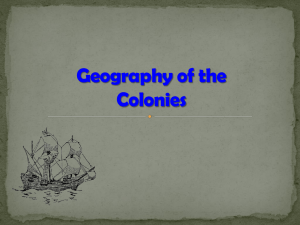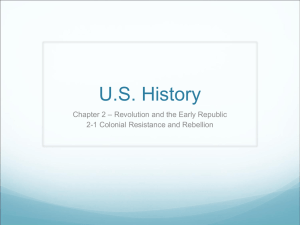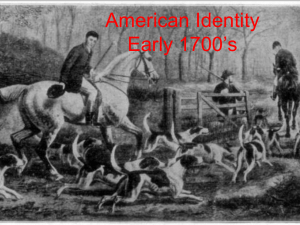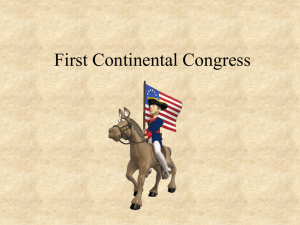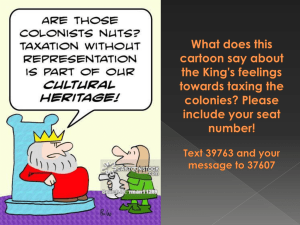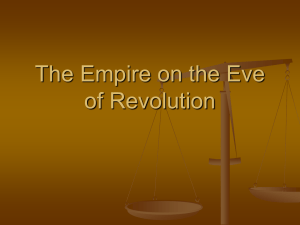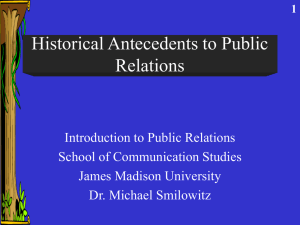Colonial American Tension
advertisement
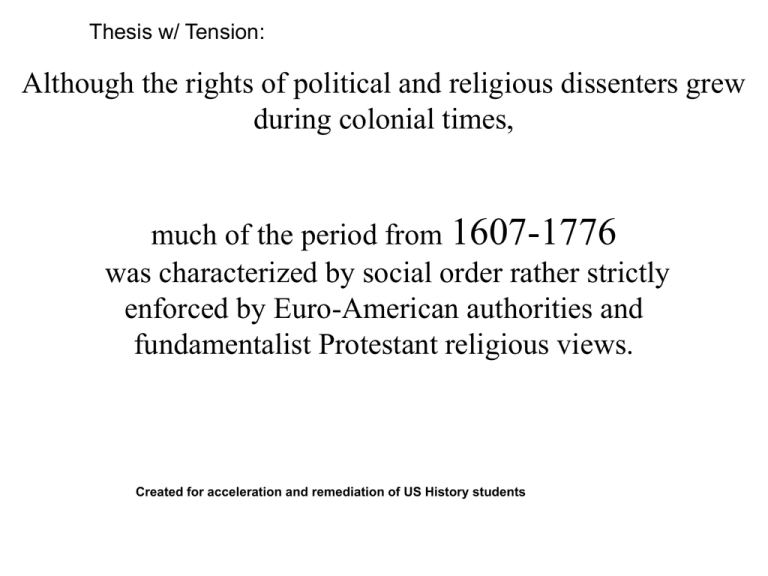
Thesis w/ Tension: Although the rights of political and religious dissenters grew during colonial times, much of the period from 1607-1776 was characterized by social order rather strictly enforced by Euro-American authorities and fundamentalist Protestant religious views. Created for acceleration and remediation of US History students Setting The Scene: The 13 Colonies were settled by many different groups intending to defend and advance their own religious views while prospering economically in the Wilderness of North America. The Pilgrims (Separatists), Puritans, Quakers, Catholics, Huguenots, and others would leave the persecution of Europe and its INQUISITION environment… for the possibilities of happiness in the New World. strongest Argument: Dissenters in early Colonial times were often ostracized, punished, or harmed for their non-conformity. Roger Williams and Ann Hutchinson were excommunicated in the 1630’s for their challenges to the moral authorities in their Puritan communities. Roger Williams would establish a new colony based on religious tolerance called Rhode Island. Anne Hutchinson’s theology of antinomianism … spirituality can be more egalitarian… predestination might entitle you to less restrictive behavior… i.e. was deemed an heretical abomination by the clergy Mary Dyer, a good friend of Anne Hutchinson, is led to her execution in Boston…her crime…she converted to join the QUAKERS! The Malleus Maleficarum was used in Europe and the Americas to identify and prosecute individuals suspected of Witchcraft… The New England Puritans were basically no fun… survival was paramount…theocracy was strident… superstition was ubiquitous. All this Paranoia made ultra-conformity endemic to the mindset of the religious leaders in Salem, Massachusetts in 1692… witchcraft trials similar to those found in Europe had begun in America. With very sketchy empirical evidence, but strong conviction in Old Testament theology…religious officials tried, convicted, and sentenced 20 “Witches” in Salem before the Massachusetts Governor intervened. Women accused of adultery could be forced to wear an “A” on their clothing to signify their unfaithfulness and shame in a society that preached much forgiveness, but practiced little. The Scarlet Letter Thesis support continued: …” much of the period from 1607-1776 was characterized by social order rather strictly enforced by Euro-American authorities and fundamentalist Protestant religious views.” 1 Samuel 17: ”David and Goliath” Gutenberg Bible In 1611 the new KING JAMES version of the BIBLE was published in England for use in all Churches… …not exactly what the Catholic Pope endorsed… too few books …not enough Latin… …Puritans were more concerned about pipe organ music in Anglican services …they feared it was the devil’s voice 3 You shall have no other gods before me. 4 You shall not make for yourself an idol in the form of anything in heaven above or on the earth beneath or in the waters below. 7 You shall not misuse the name of the LORD your God, for the LORD will not hold anyone guiltless who misuses his name. 8 Remember the Sabbath day by keeping it holy. 12 Honor your father and your mother, so that you may live long in the land the LORD your God is giving you. 13 You shall not murder. Exodus: 20:3-4,7-8,12-17 14 You shall not commit adultery. 15 You shall not steal. 16 You shall not give false testimony against your neighbor. 17 You shall not covet your neighbor's house. You shall not covet your neighbor's wife, or his manservant or maidservant, his ox or donkey, or anything that belongs to your neighbor. Images of Noah’s Arc and other Biblical highlights were inspirational to these Colonists… Was the Mayflower’s voyage not religious in nature? … a new beginning in a new WORLD Massasoit’s peace treaty with the Pilgrims in 1621 … Wampanoags + Pilgrims=PEACE Squanto shows Pilgrims how to plant… Fish+Seed+Soil+Water+Sun=Squash Native American religious practices were largely animistic and based on a spiritual reverence for nature … these too were often derided as “witchcraft” or “devil worship”. Iroquois false face society African American religious practices based on West African beliefs …”voodoo”… were also seen as threatening and forms of “witchcraft”. African American slavery and conquests of Native Americans were often justified in Colonial times on religious grounds. Legends and myths of the earliest encounters between Animistic Americans and Christian Europeans persist …Pocahontas was an heroic early Christian convert. Her new Christian name was Rebecca William Penn established QUAKER settlements in Pennsylvania…preaching pacifism and tolerance. The 1649 Act of Toleration established the colony of Maryland with tolerance promised for Roman Catholics…but not for Jews. Strict order was generally the norm in most colonial settlements, and tolerance, when offered was still limited by doctrines and prejudice. Essay thesis statement tension now identified and explained: “Although the rights of political and religious dissenters grew during colonial times,” …Yet the rights of dissenters had grown in this era, changing mindsets to eventually embrace ideas from the Enlightenment and Scientific Revolution. In 1689 John Locke’s Two Treatise on Government, theories would be applied to the evolving Constitution of the British Empire as England acquired her Bill of Rights The 1689 Bill of Rights was the most “enlightened” government contract in the western world as it entitled property holding British Citizens many of the rights and freedoms Americans value greatly to the present day. 1689 Bill of Rights… a “constitutional monarchy” is evolving That the pretended power of suspending the laws or the execution of laws by regal authority without consent of Parliament is illegal; That the pretended power of dispensing with laws or the execution of laws by regal authority, as it hath been assumed and exercised of late, is illegal; That the commission for erecting the late Court of Commissioners for Ecclesiastical Causes, and all other commissions and courts of like nature, are illegal and pernicious; That levying money for or to the use of the Crown by pretence of prerogative, without grant of Parliament, for longer time, or in other manner than the same is or shall be granted, is illegal; That it is the right of the subjects to petition the king, and all commitments and prosecutions for such petitioning are illegal; That the raising or keeping a standing army within the kingdom in time of peace, unless it be with consent of Parliament, is against law; 1689 Bill of Rights …continued That the subjects which are Protestants may have arms for their defence suitable to their conditions and as allowed by law; That election of members of Parliament ought to be free; That the freedom of speech and debates or proceedings in Parliament ought not to be impeached or questioned in any court or place out of Parliament; That excessive bail ought not to be required, nor excessive fines imposed, nor cruel and unusual punishments inflicted; That jurors ought to be duly impanelled and returned, and jurors which pass upon men in trials for high treason ought to be freeholders; That all grants and promises of fines and forfeitures of particular persons before conviction are illegal and void; And that for redress of all grievances, and for the amending, strengthening and preserving of the laws, Parliaments ought to be held frequently. In 1735 the John Peter Zenger trial was an important step toward securing rights of the freedom of the press to openly criticize the government (colonial authorities). The Great Awakening in the 1730’s – 1740’s greatly weakened the authority of the traditional Anglican and Congregationalist (Puritan) domination once seen in the Colonies. Personal relationships with God as the individual’s Savior, were valued over more traditional religious teachings… …independent and saved… The Great Awakening… was a religious revival experience that impacted the lives of all American Colonists… …whether they lived in cities, towns, villages, or hundreds of miles from the Atlantic Coast… …similar to the 21st Century event of “9/11” it caused most people to reconsider larger issues in their society and personal lives The “New Lights” would establish new Churches and Colleges to encourage their membership to grow and challenge the dogma and traditions of the “Old Lights”. Old Lights Harvard 1636 Congregational William & Mary 1693 Anglican Yale 1701 Congregational New Lights Princeton Pennsylvania Columbia Brown Rutgers Dartmouth 1746 1751 1754 1764 1766 1769 Presbyterian Nonsectarian Anglican Baptist Dutch Reformed Congregational Accompanying this religious awakening and spiritual wellspring, the scientific revolution / enlightenment thinkers began to embrace the concept of “Deism”… a belief in a Creator / Supreme Being…who established a world with “natural laws” and “natural rights”. Deists like Benjamin Franklin and Thomas Jefferson were sometimes criticized for their practices of religious freedom …however…while Franklin and Jefferson were not going to church to stay home and practice scientific applications… Jefferson’s pasta machine = macaroni & cheese! Franklin’s electricity = amusement ? Franklin’s Poor Richard’s Almanac … full of the wit and advice of America’s foremost citizen and publisher… Jefferson’s The Life and Morals of Jesus of Nazareth …the NEW TESTAMENT GOSPELS…reduced to just the words and deeds of JESUS… …they were staunch believers in protecting religious freedom by separating the powers of “Church and State” Virginia’s Declaration of Rights 1776 Section 16. That religion, or the duty which we owe to our Creator, and the manner of discharging it, can be directed only by reason and conviction, not by force or violence; and therefore all men are equally entitled to the free exercise of religion, according to the dictates of conscience; and that it is the mutually duty of all to practice Christian forbearance, love, and charity toward each other. Dissent during Colonial period would eventually become the fire of Liberty that would be manifested in the American Revolution. “We hold these truths to be self evident that all men are created equal and endowed by their creator with certain unalienable rights, among which are… life, liberty, and the pursuit of happiness” Conclusion: Dissent and freedom of speech, religion, press, assembly, and petition… …would eventually be fully recognized as rights for all Americans… …the American Revolution was a culmination of many events leading to this reality… Suggested listening for greater appreciation: 1. Witchy Woman …The Eagles 2. Take The Devil …The Eagles 3. Superstition …Stevie Wonder 4. America The Beautiful…Keb Mo "No freeman shall be ... imprisoned ... or in any way harmed . . . except by the lawful judgment of his peers ...... - Magna Carta, 1215 __1. This statement is the basis for the democratic principle of the right to 1 trial by jury 2 freedom from cruel and unusual punishment 3 freedom from double jeopardy 4 protection against self-incrimination __2. The Mayflower Compact is important to the concept of a democratic society because it represents (1) an effort by the colonists to use force to resist the King (2) a clear step toward self-government (3) an early attempt to establish universal suffrage (4) an attempt by the colonists to establish freedom of religion __3. The Mayflower Compact, House of Burgesses, and Fundamental Orders of Connecticut are all examples of the efforts of colonial Americans to (1) use democratic practices in government (2) protest British land policies (3) establish religious freedom (4) overthrow British royal governors “. . . Now, one of the most essential branches of English liberty is the freedom of one’s house. A man’s house is his castle; and whilst he is quiet, he is as well guarded as a prince in his castle. . . .” -James Otis, Against the Writs of Assistance, 1761 ___4. Which provision in the Bill of Rights includes this same belief? (1) right to a fair trial (2) protection against unreasonable search and seizure (3) guarantee against double jeopardy (4) prohibition of cruel and unusual punishment ___5. Under mercantilism, the thirteen American colonies were expected to provide Great Britain with 1 finished American-manufactured goods 2 raw materials and markets for British products 3 officials to represent colonial interests in Parliament 4 laborers to work in British factories ___6. The British system of mercantilism was opposed by many American colonists because it (1) placed quotas on immigration (2) discouraged the export of raw materials to England (3) placed restrictions on trading (4) encouraged colonial manufacturing ___7. Which statement is most accurate about the movement for independence in the thirteen colonies? (1) The independence movement began soon after the founding of the Plymouth Colony. (2) Protests against British colonial policies gradually led to demands for independence. (3) The King of England required the colonists to become economically self-sufficient. (4) The movement for independence was equally strong in all of the colonies. ___8. Which principle of government is proposed in the Declaration of Independence? 1 Political power originates with a strong central government. 2 The primary function of government is to protect natural rights. 3 A system of checks and balances is the most effective way to prevent governmental abuse of power. 4 Individual liberties must be guaranteed by a strong bill of rights. ___9. In writing the Declaration of Independence, Thomas Jefferson was most influenced by the writers of the 1 Romantic Era 2 Enlightenment 3 Renaissance 4 Middle Ages ___10. In writing the Declaration of Independence, Thomas Jefferson was influenced most by John Locke’s idea of (1) due process of law (2) natural rights (3) the rights of the accused (4) the right to privacy ___11. Which feature must a nation have to be considered a democracy? (1) a strong president (2) citizen participation in government (3) elected judges to conduct trials (4) a set of laws
